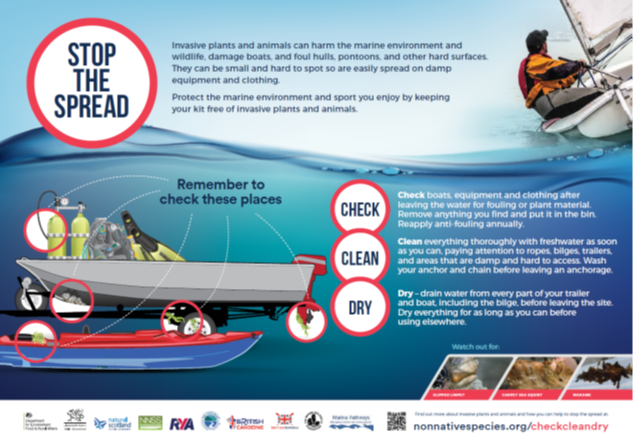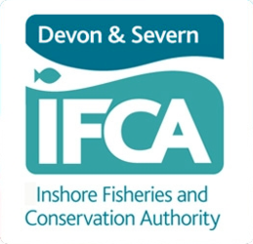Biosecurity
- Home
- Environment & Research
- Mariculture
- Biosecurity
Page review/updated 04/12/2024
(Content of page last updated: 27th June 2023)
BIOSECURITY
What is Biosecurity?
Biosecurity describes the measures and procedures taken to identify, prevent, and reduce the risk of diseases and/or non-native species from being transported to and establishing in areas where they are not currently present. Over 2,000 plants and animals have been introduced to Britain from all over the world by people. Most non-native species are harmless but around 10-15% spread and become invasive non-native species (INNS). INNS and diseases threaten biodiversity, fisheries and are costly to the economy.
Marine biosecurity
We all rely on the health of our marine environment to thrive. Once INNS become established, they can threaten the diversity of life in our seas and coasts, as well as impacting on our livelihoods and our sport, leisure and enjoyment of the marine environment. For example, damage to the marine environment can lead to financial losses to marine industries that may incur additional costs for removing biofouling on structures or damage to farmed shellfish that reduces yield.
In the marine environment, complete eradication of INNS is rarely possible or affordable and control is usually only effective on a local scale. Therefore, following best practice biosecurity measures to reduce the likelihood of introducing an INNS in the first place is highly important.
Which species should I look out for?
There are several resources online that can be used as a guide to help identify which marine non-native species to look out for in the UK. The Marine Biological Association have produced an ID guide for selected marine non-native species which can be viewed here.
Another marine identification guide, produced by CEFAS (Centre for Environment, Fisheries and Aquaculture Science), is available by contacting D&S IFCA.
How can I report sightings of INNS?
The GB Non-Native Species Secretariat details how and where to record any sightings of non-native species: https://www.nonnativespecies.org/what-can-i-do/recording/. Whenever you report sightings of INNS, the more information you can provide the better. Please include photographs and precise locations of species wherever possible.
What can I do to reduce the risk of introducing INNS?
Everyone can help stop the spread of INNS, from commercial fisheries to recreational anglers. The GB Non-Native Species Secretariat provide a wealth of information on stopping the spread of invasive species on their website: https://www.nonnativespecies.org/what-can-i-do/recording/. A recent Check, Clean and Dry poster is shown below. This campaign is aimed at anyone who uses the water for either sport, recreational or commercial purposes.

Biosecurity and the Waddeton Order
The Waddeton Fishery Order is a hybrid Regulating Order located in the upper reaches of the Dart Estuary, near Galmpton. Through the Waddeton Order, D&S IFCA manages 117 hectares of the Dart Estuary for the sole purpose of mariculture, leasing small highly affordable plots to prospective mariculturists with the objective of promoting the sustainable growth of mariculture in the District, and to aid diversification of the fishing industry in the area. Mariculture production within the Order is currently focussed on Pacific Oysters, however there are licenses available to farm several other species on the plots including mussels.
The introduction of shellfish disease or INNS could pose a serious risk to the viability of the Waddeton Order and its mariculture operators, and to the health of nearby ecosystems. Therefore, D&S IFCA implements a biosecurity plan for the Waddeton Order, which is regularly reviewed by D&S IFCA and CEFAS. The biosecurity plan identifies biosecurity risks associated with mariculture in the Order and details the control measures taken to mitigate those risks. Examples of control measures include establishing the exact provenance of stock before purchase, not accepting shellfish into the site if they are showing signs of disease, maintenance of a biosecurity log that records the results of shellfish health inspections and mortality events. In addition, best handling methods and husbandry are endorsed to ensure health of shellfish stocks are not compromised, and D&S IFCA promote biosecurity campaigns that target recreational water users.
